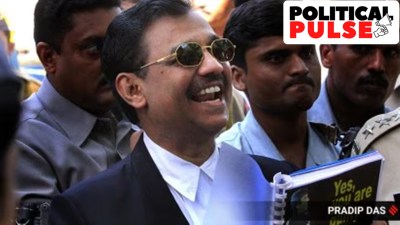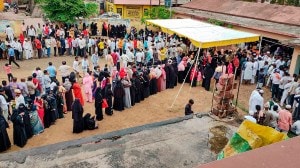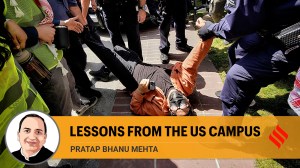- India
- International
Aung San Suu Kyi’s party dissolved: What this means for her, Myanmar
The junta’s election talk began in January this year, ahead of the second anniversary of the February 1, 2021 military coup, erasing the NLD’s 2020 election victory that crushed the United Solidarity and Development Party (USDP), a military proxy.
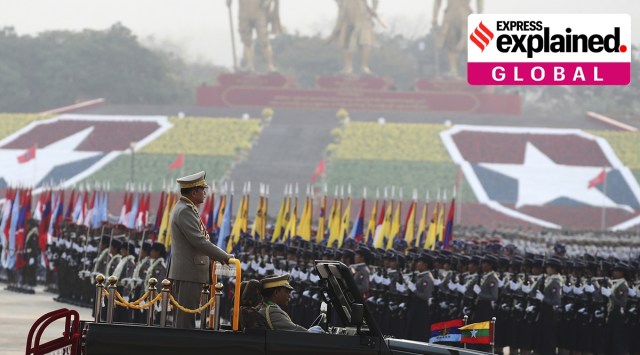 Senior General Min Aung Hlaing inspects a parade to commemorate Myanmar’s 78th Armed Forces Day in Naypyitaw on March 27. (AP)
Senior General Min Aung Hlaing inspects a parade to commemorate Myanmar’s 78th Armed Forces Day in Naypyitaw on March 27. (AP) The dissolution of Myanmar’s main political party, the National League for Democracy (NLD), led by Aung San Suu Kyi since its inception in 1988, signals that the military is drawing further inward as it seeks to hold on to its power grab through an “election”.
The run-up
The junta’s election talk began in January this year, ahead of the second anniversary of the February 1, 2021 military coup, erasing the NLD’s 2020 election victory that crushed the United Solidarity and Development Party (USDP), a military proxy.
Under the military-drafted 2008 Constitution, a state of emergency can be imposed only for two years, and thereafter, elections have to be held within six months. But on February 1, the junta extended the emergency by another six months, which will end on August 31. This means that an election could be held by February 2024, unless another extension is planned.
Junta chief Senior General Min Aung Hlaing promised a “free and fair” election, but if an electoral exercise under the auspices of the military was always going to be questionable, new election rules announced in late January removed all doubts that this was to be an election made by the junta for the junta.
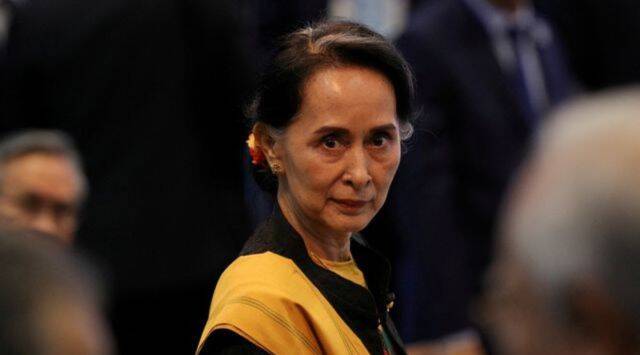 Aung San Suu Kyi attends the opening session of the 31st ASEAN Summit in Manila. (Reuters/File)
Aung San Suu Kyi attends the opening session of the 31st ASEAN Summit in Manila. (Reuters/File)
New election law

What worries the Army most is Suu Kyi.’s overwhelming popularity, as established in the 2012 bye-elections two years after her release, then in the 2015 and 2020 elections. The party won more than four-fifth of the seats in the parliament in 2020, an increase over its 2015 triumph. The coup was triggered by fears that with her absolute majority, Suu Kyi might rewrite the military-drafted Constitution to exclude it from politics.
Even with the NLD leader in jail since the the coup, the military is unsure about victory. The new laws seem aimed to write the NLD fully out of the equation.
Under the Political Parties Registration Law announced on January 26 by the country’s military-manned Election Commission, existing parties got 60 days to re-register or be automatically dissolved. The NLD, which had announced it would not contest the election, did not register. As such, it was dissolved on March 28.
Out of the 92 parties before the coup, less than 60 had re-registered by the deadline. Parties that have registered must contest.The new law imposes other tough conditions on national parties. They have to show 100,000 party members within 90 days of registration (the previous requirement was for 1,000); and 100 million kyat (or about $ 35,000) in the party’s registered bank account. They must open party offices in half of the 330 townships within 180 days, and contest at least half the constituencies countrywide, against just three previously.
With some 80 of its leaders in prison, including the 77-year-old Suu Kyi who is serving a 33-year sentence, even if the NLD had registered, it would have found it difficult to fulfil any of these conditions. The law openly favours the USDP, which is the only other party with a presence across Myanmar’s majority Bamar-dominated regions.
Most parties that have registered are ethnic political groups that will contest only in one state. Conditions for them are not as strict — they only have to show 1,000 members, a bank balance of $3,500, five party offices in their state/region, and contest just three seats.
The junta has also spoken about scrapping the first past the post system for the proportional representation system, which will again favour the USDP.
But can the elections be held at all? Unlike previous military dispensations, Myanmar’s current junta has failed to establish control over the country. Civilians in the Bamar areas have grouped into hundreds of autonomous People’s Defence Forces (PDFs) to resist the coup. They have the support of some ethnic armed organisations (EAOs), who control large swathes of territory and are training civilians in the use of weapons.
The National Unity Government, comprising winning candidates from the last election who stand in political opposition to the junta, have declared the PDFs as their armed wing, while the supporting EAOs are in a loose coalition. Together, the PDFs and EAOs may control more territory than the junta. Myanmar has branded them all “terrorists”.
Senior General Min said earlier this week at a military parade to celebrate the Myanmar Armed Forces Day that the military would take “decisive action” against the resistance.
Myanmar is bracing for more violence in the days ahead, as the junta tries to establish its writ, and the pro-democracy forces get ready to offer resistance. Some of the groups are fighting with more sophisticated weapons than earlier, given to them by the EAOs, or purchased from flourishing arms black markets.
The junta’s determination to hold the elections may only worsen the situation. While the junta appears to believe that an election might help it establish better control than rule by emergency, without the NLD’s participation, the election is likely to remain a flawed exercise in the eyes of both the people of Myanmar and the international community.
But like the Taliban in Afghanistan, the Myanmar military is immune to international pressure. Even China, which carries influence over the Tatmadaw (the military), seems to have limited say. The ASEAN five-point plan from Myanmar has so far yielded no progress, though Indonesia, now in the chair of the grouping, is said to be making some efforts.
What next for the NLD
The party has been through many trials but has so far emerged stronger after each. The first election it contested and won was in 1990, and, as it did three decades later, the military annulled the results and took over. Suu Kyi spent most of the next 20 years under house arrest. The NLD was banned in the mid-2000s. When the junta lifted the ban, it was to give the 2008 Constitution drafted by it some legitimacy.
Suu Kyi was released in 2010, but the NLD boycotted the elections.The party split. The breakaway group contested the election, faring poorly. From 2012 to 2020, the NLD went from strength to strength, until it was tripped up again by the military. From the NLD’s early decision not to contest, it appears Suu Kyi still exerts control over the party. But it is unclear for how long. Her long sentence means it could be years before she comes out, by when the generation gap in the party might become impossible to bridge.
More Explained
EXPRESS OPINION
Apr 27: Latest News
- 01
- 02
- 03
- 04
- 05











